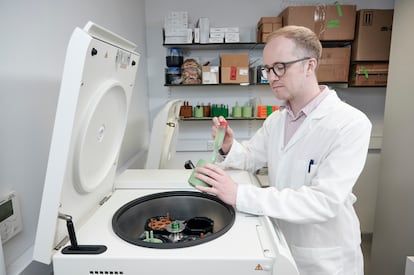A bacteria converts plastics into paracetamol


A bacterium ingests a plastic bottle, and once inside its structure, the cell ferments the waste like beer and converts it into paracetamol. This is how a scientific study—published this Monday in the journal Nature — can be summed up. This study, published for the first time in a "completely new" way, uses classical chemistry, according to Stephen Wallace, author of the study. He explains the innovation: "Using live microbes, we performed sophisticated chemical transformations, which could open up new, greener, and more sustainable ways of producing valuable materials, such as medicines, from waste."
Wallace and his scientific team at the University of Edinburgh (United Kingdom) managed to naturally induce, within a live Escherichia coli bacterium, what until now had only been observed in test tubes . This is the transformation of acid-derived molecules into key compounds for the manufacture of medicines—such as paracetamol—following a reaction known as the Lossen rearrangement. The researchers took this to the next level and were able to reproduce this ability within bacteria using only the microbial cells themselves and without resorting to complex laboratory catalysts.
“The interesting thing is that we didn't have to teach the bacteria how to do the reaction: the trick was realizing they already had the tools and just had to be guided,” Wallace explains. Within their cells, bacteria naturally contain phosphate, which can activate the chemical catalysis that interested the scientists. “What we did was use synthetic biology to build new biological pathways within the bacteria. These pathways guide the cell's chemistry toward producing the specific compound we wanted. In this case, a drug,” the author explains. So, instead of forcing the bacteria to do something new, the scientists simply gave them the right map and let their own chemistry do the rest.
Plastic comes into play at the very beginning of the process, when PET—widely used in beverage containers—is broken down into one of its building blocks, which then becomes a molecule capable of triggering the chemical reaction inside the bacteria. From there, the microorganisms transform that molecule into a key ingredient and ultimately into paracetamol. “Based on what we've observed, it's very likely that many—or even most— bacteria can perform these types of transmutations. This opens up a new way of thinking about how we might use microbes as tiny chemical factories,” Wallace notes.
Emission-free factoriesThese miniature factories also operate at room temperature and generate no carbon emissions. This is another key difference from traditional paracetamol production. The researcher explains: “It's fascinating that very few people know that the paracetamol they take begins its life as petroleum.” He adds: “What excites me most about our work is that we've demonstrated a new, greener way to manufacture this global medicine, using bacterial fermentation instead of fossil fuels.”
While it's still early to tell, this could be part of a broader shift toward more sustainable, bio-based manufacturing, both in the pharmaceutical industry and in plastics recycling. "After all, waste is just carbon, and microbes love carbon. Instead of releasing waste into the atmosphere through incineration or landfilling it, we can put it to work," Wallace adds.
In this first phase of research, only small quantities of paracetamol have been produced and extracted. The next goal is to scale up production, and finally, the results must be tested: “Human trials are a completely different step, and rightly so. Any drug intended for commercial use must undergo rigorous safety and regulatory testing, which takes time and strict oversight,” the researcher notes. So, although the scientists believe their work shows “exciting potential,” there is still a long way to go before this bacterial version of paracetamol can be considered for medical use.
EL PAÍS

%3Aformat(jpg)%3Aquality(99)%3Awatermark(f.elconfidencial.com%2Ffile%2Fbae%2Feea%2Ffde%2Fbaeeeafde1b3229287b0c008f7602058.png%2C0%2C275%2C1)%2Ff.elconfidencial.com%2Foriginal%2F140%2Fa89%2F368%2F140a893681e1239cb0412184b7c367ed.jpg&w=1280&q=100)
%3Aformat(jpg)%3Aquality(99)%3Awatermark(f.elconfidencial.com%2Ffile%2Fbae%2Feea%2Ffde%2Fbaeeeafde1b3229287b0c008f7602058.png%2C0%2C275%2C1)%2Ff.elconfidencial.com%2Foriginal%2F98c%2Fdfa%2Fcf8%2F98cdfacf81464ce4672a2039657c12c5.jpg&w=1280&q=100)
%3Aformat(jpg)%3Aquality(99)%3Awatermark(f.elconfidencial.com%2Ffile%2Fbae%2Feea%2Ffde%2Fbaeeeafde1b3229287b0c008f7602058.png%2C0%2C275%2C1)%2Ff.elconfidencial.com%2Foriginal%2F742%2Febb%2F1a5%2F742ebb1a58f542c0b706fe444cef0594.jpg&w=1280&q=100)
%3Aformat(jpg)%3Aquality(99)%3Awatermark(f.elconfidencial.com%2Ffile%2Fa73%2Ff85%2Fd17%2Fa73f85d17f0b2300eddff0d114d4ab10.png%2C0%2C275%2C1)%2Ff.elconfidencial.com%2Foriginal%2F16e%2F696%2F106%2F16e696106b856ff5fb6218cd0b6457e1.jpg&w=1280&q=100)
%3Aformat(jpg)%3Aquality(99)%3Awatermark(f.elconfidencial.com%2Ffile%2Fa73%2Ff85%2Fd17%2Fa73f85d17f0b2300eddff0d114d4ab10.png%2C0%2C275%2C1)%2Ff.elconfidencial.com%2Foriginal%2Fcb0%2Fe77%2F525%2Fcb0e77525c50ac5df55d6353641b6c63.jpg&w=1280&q=100)